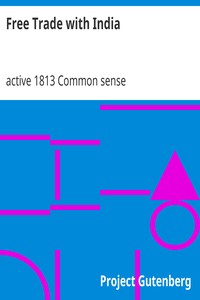Free Trade with India by active 1813 Common sense
"Free Trade with India" by Common Sense is a political treatise published during the early 19th century. This book examines the intricate dynamics between His Majesty's Government, the East India Company, and the general public regarding the contentious issue of establishing a free trade policy with India. Its primary focus revolves around the justice and policy implications of such a trade, aiming to present a clear argument against the notion of dismantling
monopolies without careful consideration of the actual trade dynamics. In "Free Trade with India," the author meticulously argues that not all monopolies are inherently detrimental and that the East India Company does not function as a true monopoly in the detrimental sense. He contends that the company provides benefits to the public by maintaining stable prices and ensuring a reliable supply of goods, much like other successful monopolies in history, such as the Post Office. The text further warns against the potential dangers that could arise from hastily opening trade with India to competition, referencing historical instances where similar actions led to the collapse of trade systems. The author advocates for minor adjustments to the East India Company's charter rather than radical changes, cautioning that significant alterations could jeopardize the existing benefits enjoyed by the nation. (This is an automatically generated summary.)
Read or download for free
| Reading Options | Url | Size | |||
|---|---|---|---|---|---|
| Read now! | https://www.gutenberg.org/ebooks/36939.html.images | 56 kB | |||
| EPUB3 (E-readers incl. Send-to-Kindle) | https://www.gutenberg.org/ebooks/36939.epub3.images | 89 kB | |||
| EPUB (older E-readers) | https://www.gutenberg.org/ebooks/36939.epub.images | 88 kB | |||
| EPUB (no images, older E-readers) | https://www.gutenberg.org/ebooks/36939.epub.noimages | 87 kB | |||
| Kindle | https://www.gutenberg.org/ebooks/36939.kf8.images | 162 kB | |||
| older Kindles | https://www.gutenberg.org/ebooks/36939.kindle.images | 154 kB | |||
| Plain Text UTF-8 | https://www.gutenberg.org/ebooks/36939.txt.utf-8 | 45 kB | |||
| Download HTML (zip) | https://www.gutenberg.org/cache/epub/36939/pg36939-h.zip | 86 kB | |||
| There may be more files related to this item. | |||||
Similar Books
About this eBook
| Author | Common sense (Writer), active 1813 |
|---|---|
| LoC No. | 95844840 |
| Title |
Free Trade with India An Enquiry into the True State of the Question at Issue Between His Majesty's Ministers, the Honorable the East India Company, and the Public at Large, on the Justice and Policy of a Free Trade to India |
| Credits |
Produced by David E. Brown and The Online Distributed Proofreading Team at www.pgdp.net (This file was produced from images generously made available by The Internet Archive) |
| Reading Level | Reading ease score: 46.7 (College-level). Difficult to read. |
| Language | English |
| LoC Class | HF: Social sciences: Commerce |
| Subject | East India Company |
| Subject | Great Britain -- Commerce -- India |
| Subject | India -- Commerce -- Great Britain |
| Category | Text |
| EBook-No. | 36939 |
| Release Date | Aug 1, 2011 |
| Most Recently Updated | Jan 7, 2021 |
| Copyright Status | Public domain in the USA. |
| Downloads | 309 downloads in the last 30 days. |
| Project Gutenberg eBooks are always free! | |

